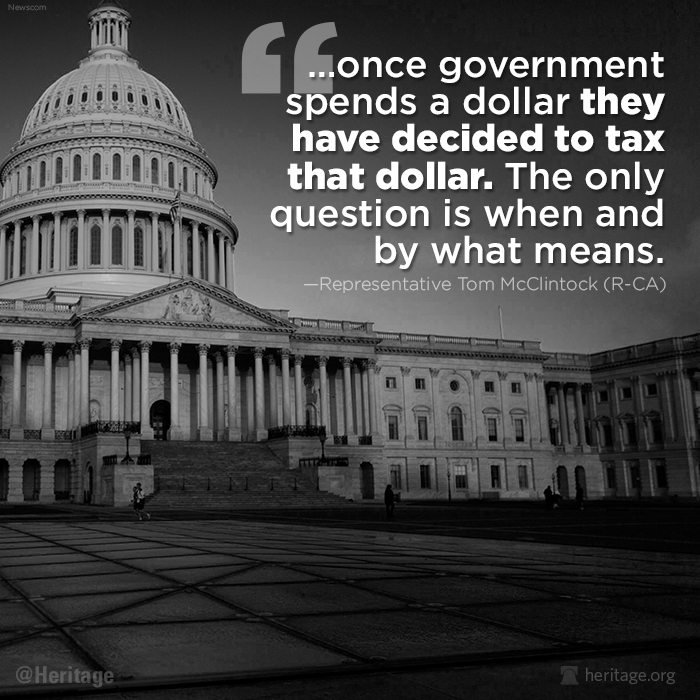The congressional budget deal includes some “user fees.”
For the Washington establishment, that’s apparently the politically correct way of telling Americans they’ll be paying more to the federal government. For the rest of us, it’s a tax increase.
The Ryan-Murray budget deal, which passed the House on a 332-94 vote, includes a number of “fee” increases. One would make flying more expensive. Travelers are currently charged $2.50 per flight under the Transportation Security Administration’s airline security “fee.” Under the budget deal, that would increase to $5.60 per flight or $11.20 for a round-trip ticket.
Supporters of the deal are claiming this isn’t a tax increase—but take a look at your airline receipt. The airline security charge is just one of the taxes you’ll see. According to Delta Airlines, there’s also the Domestic Transportation Tax (7.5 percent), Travel Facilities Tax ($8.40), and U.S. International Transportation Tax ($17.20). These are all considered taxes.
When asked if the “user fees” were a code name for a tax increase, Representative Tom McClintock (R-CA) explained it this way: “I happen to believe once government spends a dollar they have decided to tax that dollar. The only question is when and by what means.”

And in the case of this airline security fee increase, the money isn’t even going back to the TSA to fund or improve security. Instead, as Heritage’s Cassandra Lucaccioni explained, “it will be deposited annually into a general fund of the Treasury.”
Not all government user fees are problematic. If they’re used to provide services to distinct groups of individuals or specific businesses or industries, they might make sense. That’s not what’s happening here.
“If a higher fee does not directly cover the cost of a government service and instead goes to pay for more spending, then it is akin to a tax increase,” said Curtis Dubay, Heritage’s senior tax policy analyst. “The budget deal uses the higher fees to cover the cost of more spending; hence it is essentially a tax hike.”
Taxpayers are tired of Washington’s gimmicks and games—and conservatives on Capitol Hill shouldn’t fall for this sneaky wordplay. The $63 billion spending hike in the Ryan-Murray budget has to come from somewhere.
Only in Washington could something like this fly. The American people shouldn’t buy it—or, in this case, pay for it.
Read the Morning Bell and more en español every day at Heritage Libertad.
Quick Hits:
For the Washington establishment, that’s apparently the politically correct way of telling Americans they’ll be paying more to the federal government. For the rest of us, it’s a tax increase.
The Ryan-Murray budget deal, which passed the House on a 332-94 vote, includes a number of “fee” increases. One would make flying more expensive. Travelers are currently charged $2.50 per flight under the Transportation Security Administration’s airline security “fee.” Under the budget deal, that would increase to $5.60 per flight or $11.20 for a round-trip ticket.
Supporters of the deal are claiming this isn’t a tax increase—but take a look at your airline receipt. The airline security charge is just one of the taxes you’ll see. According to Delta Airlines, there’s also the Domestic Transportation Tax (7.5 percent), Travel Facilities Tax ($8.40), and U.S. International Transportation Tax ($17.20). These are all considered taxes.
When asked if the “user fees” were a code name for a tax increase, Representative Tom McClintock (R-CA) explained it this way: “I happen to believe once government spends a dollar they have decided to tax that dollar. The only question is when and by what means.”

And in the case of this airline security fee increase, the money isn’t even going back to the TSA to fund or improve security. Instead, as Heritage’s Cassandra Lucaccioni explained, “it will be deposited annually into a general fund of the Treasury.”
Not all government user fees are problematic. If they’re used to provide services to distinct groups of individuals or specific businesses or industries, they might make sense. That’s not what’s happening here.
“If a higher fee does not directly cover the cost of a government service and instead goes to pay for more spending, then it is akin to a tax increase,” said Curtis Dubay, Heritage’s senior tax policy analyst. “The budget deal uses the higher fees to cover the cost of more spending; hence it is essentially a tax hike.”
Taxpayers are tired of Washington’s gimmicks and games—and conservatives on Capitol Hill shouldn’t fall for this sneaky wordplay. The $63 billion spending hike in the Ryan-Murray budget has to come from somewhere.
Only in Washington could something like this fly. The American people shouldn’t buy it—or, in this case, pay for it.
Read the Morning Bell and more en español every day at Heritage Libertad.
Quick Hits:
- Ever wondered how America got $17 trillion in debt? In his latest column, Heritage President Jim DeMint says Congress’ budget deal provides an example.
- PolitiFact awarded President Obama with its “Lie of the Year” designation. Click here to find out the winner.
- Dishonest, Orwellian word games undermine the GOP’s credibility, argues Sean Davis at The Federalist.
- Do you know who Paul Teller is? Here’s why it matters that he got fired from a Republican group.
- Even the “Sexiest Man Alive” can’t make this unpopular, unworkable law appealing.
- Want to know how Interpol works? Don’t trust Hollywood. A Heritage expert explains how the system really works.
- With his popularity dropping, President Obama seems to be distancing himself from his “signature legislation.”
- Is the “Buffett Rule” already happening? The facts show the top 1 percent of earners already pay three times the effective rate of the middle class.